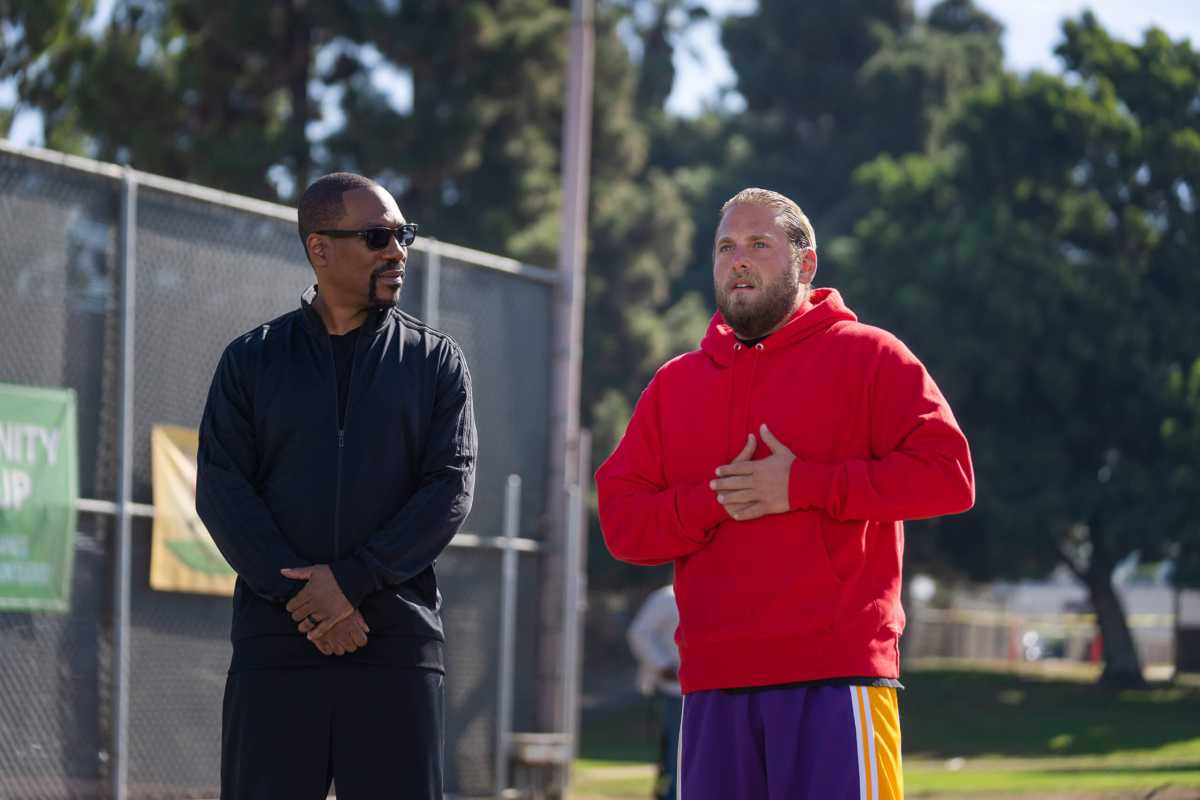Kenya Barris’ “You People” is a comedy that plays like a two-hour lecture. It’s didactic rather than funny, treating its characters as avatars for discourse about racism. In Hollywood liberal tradition, it ends by pulling away from the truths it wants to impart in order to reassure rather than disturb. A love story between Ezra (Jonah Hill), a white Jewish man, and his Black fiancée Amira (Lauren London), it conveys a sour pessimism about interracial relationships until it suddenly changes its mind to offer up a happy ending. If it embraced cringe comedy, it’d be much better.
A stockbroker who hates his job, Ezra is also a part-time podcaster who hosts a discussion of “the Culture” (by which he means Black culture) with Sam (queer actor Sam Jay), a Black lesbian. Waiting for an Uber, he jumps into the back seat of a car driven by Amira. She’s not his Uber driver, but despite taking offense at the assumption all Black people look alike, she agrees to take him to his destination. The two fall in love and date, which becomes increasingly tense the more they interact with each other’s parents. The Cohens include Shelley (Julia-Louis Dreyfuss), Arnold (David Duchovny) and Ezra’s lesbian sister Liza (Molly Gordon). The Mohammeds are led by patriarch Akbar (Eddie Murphy), who sings the praises of Louis Farrakhan when they meet for dinner. As their wedding looms, they spend an increasing amount of unpleasant time with their future in-laws.
Shelley and Akbar are set up as opposite but parallel archetypes. Both even get scenes in cars talking about music with Amira and Ezra, respectively. As if it were delivering a vaccine against this criticism, “You People” brings up the idea that Akbar is a stereotypical angry Black man. You could call him passive-aggressive, but the aggression isn’t masked at all by his cool demeanor and low voice. On the other side, Shelley is overly eager to show off her liberal bona fides, with no idea how patronizing she comes across. She’s the kind of white person who filled her Instagram feed in June 2020 with posts declaring her dedication to Black Lives Matter and anti-racism and has never spoken about the subject again since. Within minutes of meeting Amira, she jumps into a performative discussion of police brutality. Murphy projects Akbar’s personality with a contained performance, while Dreyfuss plays Shelley broadly. Although Duchovny’s acting is more subdued, he gets a similar personality trait: his fondness for the rapper and reality TV star Xzibit is a running joke. Hill pulls off a tricky bit of acting several times: getting into a very awkward line of discussion and babbling with no idea what he’s saying.
Despite hip-hop needle-drops (including songs as obscure as South Central Cartel’s 1994 “Gang Stories”), drug references, and visual nods to graffiti, “You People” looks like a Very Special Episode of a network TV show. (Indeed, Barris created the ABC comedy “black-ish.”) If it were funnier, this wouldn’t necessarily be a defect. Queer characters exist on the sidelines of this story about heterosexual marriage. Liza has no role to play except correcting her mother’s politics. Sam is treated as “one of the boys,” especially at a bachelor party in Las Vegas. (With her butch appearance, Akbar has to be told she’s a woman.) Yet she doesn’t get to live out her desires the way they’d like to. Her professed plan to take drugs and make out with strippers goes unrealized. Even the sudden introduction of Ezra’s past cocaine use, during that party, seems parachuted in from a bro comedy like “The Hangover.” Up to that point, the character just does not act like a person who’d have a coke dealer on tap.
“You People” gets at something real: As hip-hop has become the most popular form of music in the US, an awful lot of white people see it as a glimpse into Black people’s lives they haven’t personally witnessed or shared. The scene where Akbar plays a certain Jay-Z and Kanye West hit to Ezra as the latter refuses to even acknowledge the slur in its title, while declaring his love for the song, does express this with real discomfort. But for all their rhetoric, the Black people in “You People” are forgiving. Had Amira gotten angry at Ezra and refused to drive him, the plot would have never gotten started. However much Amira and Ezra love each other, an ending where the differences in their experiences and anger between their families drives them apart is far more believable than the actual one.
“You People” | Directed by Kenya Barris | Netflix | Opens Jan. 20th at the Quad, begins streaming Jan. 27th
































